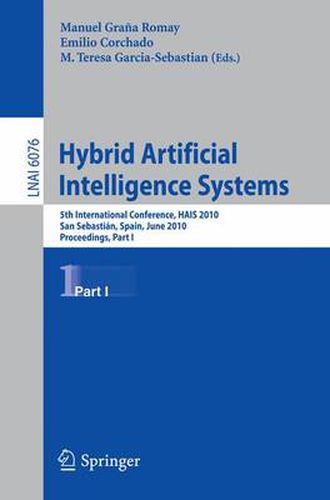Readings Newsletter
Become a Readings Member to make your shopping experience even easier.
Sign in or sign up for free!
You’re not far away from qualifying for FREE standard shipping within Australia
You’ve qualified for FREE standard shipping within Australia
The cart is loading…






th The 5 International Conference on Hybrid Artificial Intelligence Systems (HAIS 2010) has become a unique, established and broad interdisciplinary forum for researchers and practitioners who are involved in developing and applying symbolic and sub-symbolic techniques aimed at the construction of highly robust and reliable problem-solving techniques, and bringing the most relevant achievements in this field. Overcoming the rigid encasing imposed by the arising orthodoxy in the field of arti- cial intelligence, which has led to the partition of researchers into so-called areas or fields, interest in hybrid intelligent systems is growing because they give freedom to design innovative solutions to the ever-increasing complexities of real-world pr- lems. Noise and uncertainty call for probabilistic (often Bayesian) methods, while the huge amount of data in some cases asks for fast heuristic (in the sense of suboptimal and ad-hoc) algorithms able to give answers in acceptable time frames. High dim- sionality demands linear and non-linear dimensionality reduction and feature extr- tion algorithms, while the imprecision and vagueness call for fuzzy reasoning and linguistic variable formalization. Nothing impedes real-life problems to mix diffic- ties, presenting huge quantities of noisy, vague and high-dimensional data; therefore, the design of solutions must be able to resort to any tool of the trade to attack the problem. Combining diverse paradigms poses challenging problems of computational and methodological interfacing of several previously incompatible approaches. This is, thus, the setting of HAIS conference series, and its increasing success is the proof of the vitality of this exciting field.
$9.00 standard shipping within Australia
FREE standard shipping within Australia for orders over $100.00
Express & International shipping calculated at checkout
th The 5 International Conference on Hybrid Artificial Intelligence Systems (HAIS 2010) has become a unique, established and broad interdisciplinary forum for researchers and practitioners who are involved in developing and applying symbolic and sub-symbolic techniques aimed at the construction of highly robust and reliable problem-solving techniques, and bringing the most relevant achievements in this field. Overcoming the rigid encasing imposed by the arising orthodoxy in the field of arti- cial intelligence, which has led to the partition of researchers into so-called areas or fields, interest in hybrid intelligent systems is growing because they give freedom to design innovative solutions to the ever-increasing complexities of real-world pr- lems. Noise and uncertainty call for probabilistic (often Bayesian) methods, while the huge amount of data in some cases asks for fast heuristic (in the sense of suboptimal and ad-hoc) algorithms able to give answers in acceptable time frames. High dim- sionality demands linear and non-linear dimensionality reduction and feature extr- tion algorithms, while the imprecision and vagueness call for fuzzy reasoning and linguistic variable formalization. Nothing impedes real-life problems to mix diffic- ties, presenting huge quantities of noisy, vague and high-dimensional data; therefore, the design of solutions must be able to resort to any tool of the trade to attack the problem. Combining diverse paradigms poses challenging problems of computational and methodological interfacing of several previously incompatible approaches. This is, thus, the setting of HAIS conference series, and its increasing success is the proof of the vitality of this exciting field.